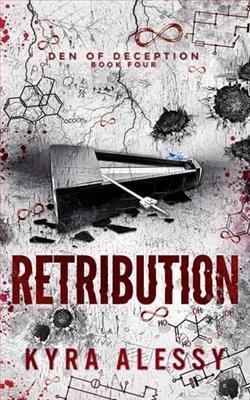Page 14 of Jax
Quinn leaned out and entered a code with mechanical ease, like this was routine. Like this gate didn’t hum with teeth. The keypad blinked green, and the gate shuddered reluctantly. It didn’t open so much as protest. Every groan of the motor sounded like a warning we were choosing not to hear.
My breath caught, but I didn’t let it show, not in my shoulders, not in my face, not in the way I sat perfectly upright, spine pressed to the seat-back, even as every instinct screamed this was a mistake.
Bad place. Bad people. Wrong direction.
My palms were slick against my thighs, but I didn’t wipe them. Movement meant reaction. Reaction meant fear. I could be unraveling and still look like I was bored in a board meeting. Trauma teaches you how to perform.
The gate opened slowly, like it was waiting for me to change my mind. I didn’t. I couldn’t. They had Violet. And the only thing worse than what waited behind that gate was what they’d do if I didn’t play along.
The moment the tires crossed the threshold, the quiet changed. It thickened, took on weight, as if the air itself had been holding its breath. Not peaceful, never that, but padded and padded again, the kind of hush you find in places meant to contain people, or study them. It pressed against the glass like a second atmosphere, as if even sound had been ordered to behave.
Gravel crackled beneath us in slow, even crunches as we followed the winding drive, the forest tightening around us with each turn. Trees grew too close, too tall, their bases cleared just enough to see through. It wasn’t landscaping. It was surveillance logic. This place hadn’t been designed for comfort. It had been constructed for control.
Quinn kept driving. I kept cataloging, the muscle memory of vigilance refusing to loosen its grip.
When the woods finally pulled back, they did so all at once, revealing a clearing so clean it felt scraped into the land. I told myself to look. To really look. If I was ever going to get out, I had to know what I was up against. But my stomach twisted even as my eyes moved, because the more I saw, the more impossible it felt.
At first glance, the place was picturesque, the kind of house you’d expect to see framed on a calendar for “country living.” I took in the white porch railings, symmetrical windows catching the late light, and fresh gravel paths winding through grass clipped too neat to be wild. It looked like a quintessential country home, the kind that dotted the rural edges outside Kansas City. Typical of these parts, if not a little newer, a little shinier than most. The kind of house meant to suggest safety, family, and quiet evenings on the porch swing.
But the longer I stared, the more the edges started to show. A glint in the tree line that wasn’t sunlight. A birdhouse too perfectly hung, its angles deliberate in a way no one who actually lived here would bother with. At first I thought I was imagining it, seeing patterns where there weren’t any. But once I spotted one, the rest revealed themselves, like brushstrokes bleeding through a canvas, the hidden image surfacing no matter how carefully it had been painted over.
This wasn’t just a house. It was a stage set, dressed to convince anyone who didn’t know better that safety could be real.
My breath caught. If I could see it, maybe they already knew I was looking. Maybe they were watching me right now.
The memory of their voices pushed in cold and certain:Find a way. Get the layout. Don’t fail us. Or your sister won’t live to see another day.
I swallowed hard and forced my eyes to trace the paths again: the porch railings, the wide-open yard that looked welcoming until you realized it herded you toward a single narrow entrance. None of it was accidental. Every line was deliberate. Every piece of it whispered fortress.
To me, it felt like a trap.
The voice had said escape would be simple. But standing here, with cameras pretending to be shadows and walls pretending to be safety, I knew better. Simple was the lie.
The SUV slowed as we approached the house. I kept my eyes forward and my body still. I didn’t let myself flinch, not when I saw them waiting, not even when my stomach twisted hard enough to bruise.
Four men waited on the porch. From a distance, they didn’t look like a threat. Not exactly. They weren’t brandishing weapons or blocking the door, at least. But they didn’t seem exactly welcoming, either.
As I drew closer, the shape of it came into focus. The stiffness wasn’t hostility; it was discipline. The word I was looking for was militant. Each of them carried it differently: one leaning against a post, casual on the surface but rooted too firmly to be chance; another standing square, arms crossed like he could outlast a storm; a third with a looseness that was only camouflage for the calculation in his eyes; the last marked bythe knife at his boot, worn with the same unconscious certainty as a wedding band.
It should have unnerved me more than it did. But as their faces resolved in the light, I caught something else beneath the structure, subtle but undeniable. The seriousness wasn’t cruelty. It wasn’t disdain. It was respect. Respect for the situation, for the weight of what this house represented, maybe even for me, though I wasn’t ready to believe that yet.
They weren’t pretending to be anything else. They were guards. Protectors. Men who had taken it upon themselves to stand watch, to hold a line I hadn’t asked them to hold.
And I didn’t know why. Why would men like this choose to protect someone like me?
For a beat, I stayed frozen inside. Muscles coiled, stomach clenched, and instincts scrambled beneath the surface while I kept my face neutral and my breath even. I didn’t trust them enough to relax. I didn’t know these men from Adam. There was no way to know if they’d ever soften, or if welcome was even part of their vocabulary.
But then, one of them shifted his weight, settling into an easier stance, and another’s gaze flicked over me, not with suspicion, but with something quieter, almost human. A hint, small but there, that beneath all that militant control was a softness they hadn’t forgotten.
Detective Mercado took a deep breath and shot me a brief smile as he shut his car off. “Well, here we are. Are you ready?”
I fought the urge to roll my eyes. Of course I wasn’t ready. Whocouldbe ready to move into a strange house full of strange men who were supposed to be your protectors, but were in reality the very people you were being forced to betray? But I couldn’t say any of that. So instead, I gave him a small nod. “Ready as I’ll ever be, I guess.”
He nodded back. “Yeah, that sounds about right. You know, this is the third time I’ve done this now. These guys haven’t let me down yet. They aren’t going to start now. You can trust them.”
I took a deep breath, and opened the car door. I stepped out into the humid night air, and somehow, without the glass of the windshield separating me from this place, it all felt more real. More final.
They remained still and watchful as I approached. Their silence wasn’t threatening so much as deliberate, like they’d been trained to let the weight of it do the work. Not curiosity. Not cruelty. Just assessment.















